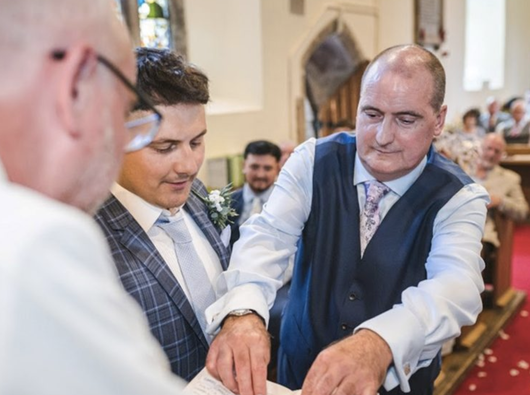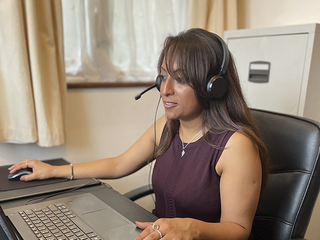Hodgkin lymphoma treatment types
The main types of treatment for Hodgkin lymphoma are chemotherapy and radiotherapy. You may need to take other medicines as well, to keep you as well as possible.
Chemotherapy
Most people with Hodgkin lymphoma will have chemotherapy. Chemotherapy uses cell-killing drugs to kill cancerous cells and stop them from multiplying.
How you have chemotherapy
You normally have chemotherapy in an outpatient clinic, which means you only have to make a daytime visit to the hospital. You may need to stay overnight on some occasions and with some drugs.
Most chemotherapy is given into a vein, so it goes directly into your bloodstream. You might have it as a drip into your arm or hand. Or you might have a central line, which is a thin tube that goes into a vein in your chest. The central line stays in during the whole course of treatment, so you don’t have to keep having a drip fitted.
Some chemotherapy drugs are taken as tablets.
Chemotherapy drugs
When you have chemotherapy, you’ll have a combination of drugs that work well together. The main chemotherapy combinations for Hodgkin lymphoma are ABVD and eBEACOPDac. Some people will have treatment with one of these combinations, and some people will have both.
ABVD stands for:
- A: Adriamycin™ (also known as doxorubicin or hydroxydaunorubicin)
- B: bleomycin
- V: vinblastine
- D: dacarbazine.
A cycle of ABVD is two treatments with ABVD two weeks apart, so one cycle takes four weeks.
eBEACOPDac (sometimes written as escBEACOPDac) stands for:
- e or esc: escalated (this means you have a higher dose)
- B: bleomycin
- E: etoposide
- D: doxorubicin
- C: cyclophosphamide
- O: Oncovin™ (also called vincristine)
- P: prednisolone
- Dac: dacarbazine
A cycle of eBEACOPDac takes three weeks. You have treatment for two weeks, followed by a week of no treatment. If you have eBEACOPDac you might have between two and six cycles of treatment.
Some hospitals may use a slightly different combination called eBEACOPP. This uses a drug called procarbazine instead of dacarbazine. This is becoming less common, because research suggests dacarbazine is as effective as procarbazine but causes less side effects.
If you’ve been diagnosed with stage 3 or 4 Hodgkin lymphoma, your doctor may recommend you have treatment with a drug called brentuximab vedotin, in combination with the chemotherapy drugs doxorubicin, dacarbazine and vinblastine. Brentuximab vedotin is a type of treatment that combines an antibody with chemotherapy. It finds and attaches to a protein on cancer cells, delivering chemotherapy directly to the cell to destroy it.
You might have a different combination of drugs if you are:
- over 60 and not fit and well enough for strong treatments
- under 18
- taking part in a clinical trial
- having treatment for Hodgkin lymphoma that has come back.
Ask your hospital team for information about any chemotherapy drugs they recommend.
How many cycles of chemotherapy will I need?
The number of cycles you need will depend on several things, including whether you have early or advanced stage lymphoma, and how well the lymphoma responds to treatment.
Many people start off by having two cycles of chemotherapy. You then have a PET-CT scan to see if there are still signs of lymphoma in your body. Depending on the result, you may then have radiotherapy, more chemotherapy, or a combination of both.
Most people will have between two and six cycles of chemotherapy to get the Hodgkin lymphoma into remission. Remission means there are no signs of lymphoma left in the body.
"Chemotherapy is hard, but it’s doable. The specialist nurses are there to help, so don’t be afraid to talk to them about any worries you have or any side effects you're having."
Lawrence, diagnosed with Hodgkin lymphoma in 2005.

Radiotherapy
Radiotherapy uses high energy rays to kill cancer cells in a specific area. Your doctor will usually recommend you have chemotherapy first, before deciding if you need radiotherapy.
It’s more common to have radiotherapy if you have early stage Hodgkin lymphoma. Some people with advanced stage Hodgkin lymphoma might have radiotherapy, but this is less common.
Before you have radiotherapy, you’ll have scans so your doctors know exactly where to target it, and they’ll mark this on your body. The actual treatment only takes a short time and it isn’t painful. You lie still inside a doughnut-shaped scanner with the treatment area exposed.
You normally have radiotherapy as an outpatient (so there’s no need to stay in hospital overnight) for up to three weeks. You’ll come to hospital for treatment every day during this time, apart from weekends.
Radiotherapy doesn’t make you radioactive and it’s fine to be around other people as normal.
Other medicines you might have
You’ll probably need to take some other medicines during your treatment, to keep you as well as possible. These might include:
- steroids, which can help chemotherapy to work better, and help with sickness
- anti-sickness medicines
- treatments to help if you have a sore mouth
- injections to increase your number of white blood cells, if your levels are low
- antibiotics, antivirals or antifungals to treat infections.
Your doctor or nurse will give you information about any treatments they recommend, including how and when to take them and any side effects to expect. It might be a lot to remember, especially if you have different medicines to take at different times. Don’t be afraid to ask your healthcare team any questions you have about your medicines and ask them to repeat anything you’re not sure about.
Treatment for nodular lymphocyte-predominant Hodgkin lymphoma
If you have a rare type of Hodgkin lymphoma called nodular lymphocyte-predominant Hodgkin lymphoma, you are likely to have different types of treatment to the ones mentioned above. The type of treatment will depend on the stage of lymphoma, and could include:
- active monitoring (watch and wait)
- surgery to remove the affected lymph node or nodes
- radiotherapy
- chemotherapy
- a type of targeted therapy called rituximab.
You can read more about treatment for nodular lymphocyte-predominant Hodgkin lymphoma on the Lymphoma Action website.
Clinical trials
Your doctor might ask if you want to have treatment as part of a clinical trial. Clinical trials help researchers develop new treatments, and improve existing ones.
Taking part in a clinical trial has benefits, like the chance to have a new treatment that might not be available otherwise. You’ll be very closely monitored and have detailed follow-up. But it does come with uncertainties, so it’s up to you whether you take part. If you don’t want to be in a trial, or there isn’t a suitable trial running, you’ll be given the best standard care that’s right for you.

Worried about anything or have questions?
If you need someone to talk to, please don't hesitate to contact our Support Service by phone or email.
